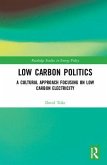The dependency on carbon-based materials and energy sources as well as the necessity of reducing greenhouse gas emissions have been recognized as major challenges of the 21st century. Firms are central to the effort to grapple with these carbon challenges due to the large material flows they process and their capabilities for technological innovation. Carbon developments primary taking place within the natural environment alter the business environment: fossil fuel scarcity results in significant price increases; climate change has direct and indirect effects that change established production and consumption patterns. As such, firms face the emergence of carbon constraints. By effective carbon management and substantial efforts to curb greenhouse gas emissions, firms are therefore not only central in contributing to a decarbonization of society; they also pave their own way for future profitability and competitiveness. This book sheds light on these phenomena from an industrial ecology perspective and investigates the consequences for corporate strategies, risk management, and firm performance.
Hinweis: Dieser Artikel kann nur an eine deutsche Lieferadresse ausgeliefert werden.
Hinweis: Dieser Artikel kann nur an eine deutsche Lieferadresse ausgeliefert werden.








